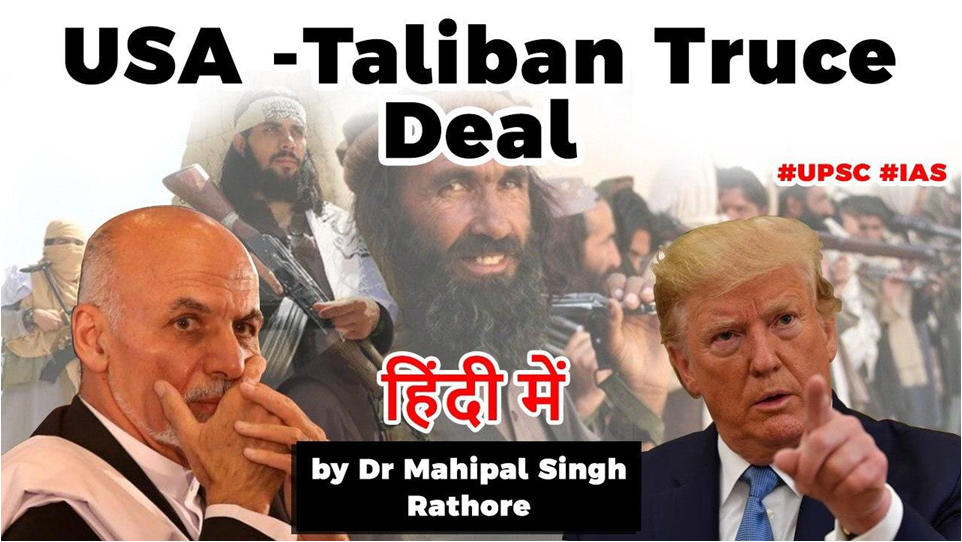Table of Contents

‘Truce’ or ‘A roadmap to Peace’
- A seven-day truce agreement between the US and the Taliban in Afghanistan came into effect on late evening of Friday 21st February 2020.
- The initial agreement is for a ‘reduction in violence’ (RIV)
Is Afghanistan close to peace?
- If the reduction in violence holds, the U.S. and the Taliban will then sign another peace agreement
- This would be followed by all-Afghan peace talks within 10 days .
- The agreement struck during negotiations between US and Taliban representatives, if maintained, could secure a peace deal that would lead to a withdrawal of American forces from Afghanistan.
- The negotiations(after successful truce) aim to achieve a “comprehensive and permanent cease-fire that ends the Afghan War.
- Intra-Afghan talks with various political parties in the country.
- S. and the Taliban both say they are close to peace after 18 years of war.
- 3,500 members of the international coalition forces have died since the 2001 invasion, more than 2,300 of them American.

But Obama ended the Afghanistan war, didn’t he?
- In 2014, NATO’s international forces – wary of staying in Afghanistan indefinitely – ended their combat mission, leaving it to the Afghan army to fight the Taliban.
- 2014 was the bloodiest year in Afghanistan since 2001.
- NATO exit gave the Taliban momentum, as they seized territory and detonated bombs against government and civilian targets.
- Operation Enduring Freedom
- Operation Resolute Support
- About 14,000 US troops and some 17,000 troops from 39 NATO allies and partner countries are stationed in Afghanistan in a non-combatant role.

Continuing Violence
- The conflict has killed 157,000 so far, of which 43,000 are civilians.
- In early 2019, Afghan President Ashraf Ghani had revealed that 45,000 members of his armed forces had been killed in the past five years.
Taliban presence increasing
- Despite the heavy US presence, the Taliban now controls or holds influence over more Afghan territory than at any point since 2001 and has carried out near-daily attacks against military outposts throughout the country.
- In 2018, the Taliban was openly active across 70% of Afghanistan.

How is Taliban still so powerful even after 18 years of fighting USA+ allies?
- Local legitimacy
- Support from Pakistan* and other regional groups
- Taliban is RICH – It makes about $1.5 Billion per year.
- Opium trade – Afghanistan is the world’s largest opium producer, and most opium poppies – used for heroin – are grown in Taliban-held areas.

Does the current Truce apply to Non Taliban forces?
- NO
- Afghan forces will keep up normal military operations against other armed groups, such ISIL (ISIS)
- There would be a communications channel between the US and the Taliban
How Important is the deal for Afghanistan as a nation?
- The very political future of the country is at stake.
- What system of government will ultimately triumph?
- Taliban – Elected govt power sharing?
Why does Taliban suddenly want peace?
- Multiple rounds of tense but cordial negotiations have taken place since many years between dark-suited American diplomats and turbaned Taliban (ex)fighters
- Location – Doha, Qatar.
- The current deal has come through after several negotiating sessions in Qatar.

- The Taliban and the United States had started discussions about a “roadmap for peace” as early as December 2018, but the negotiations proved immediately complicated, especially due to the refusal of the guerrillas to negotiate with the legitimate government of Kabul.
- S. envoy – Zalmay Khalilzad

US Presidential Election 2020
- President Donald Trump had promised an END to WARS of USA in 2016.
- In a crucial re-election battle, he may be able to make good on his promise to bring US troops home.
- The stakes for the Trump administration and for the US are high.
Afghanistan Presidential Elections 2019

Possible hurdles in long lasting peace agreement
- The Taliban continue to refuse US envoy Khalilzad’s demand that a S. counterterrorism force would stay as long as a terrorist threat remains.
- To ensure that Afghanistan does not return to harsh Islamic rule; preserve the gains made in women’s rights, rule of law, and other issues; or guarantee that Afghanistan is no longer a safe haven for terrorists.
- In the longer term the Taliban is said to have agreed not to host, train or fundraise for international terrorists in the areas they control.
Latest Burning Issues | Free PDF






















 WhatsApp
WhatsApp